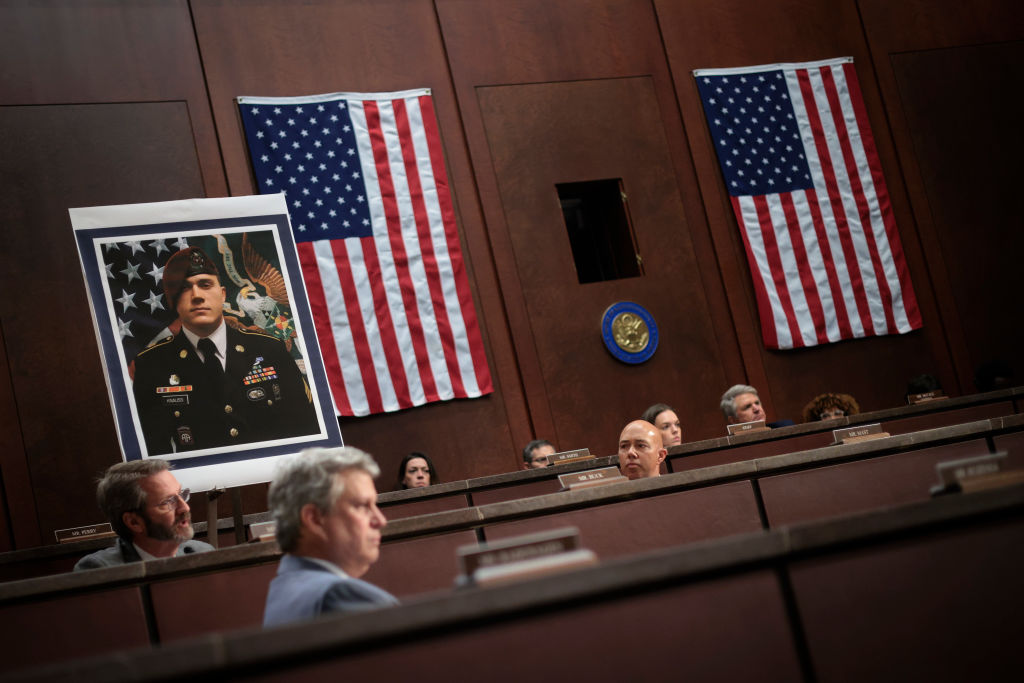Last week, the Biden administration’s mouthpieces kicked into gear with two nearly identical stories touting the threat that a few high-profile Republican heretics pose to the American proxy war in Ukraine.
On March 15, the Washington Post reported on “A Republican ‘civil war’ on Ukraine,” while the following day Politico published a story headlined, “Wanted: A GOP presidential contender who supports Ukraine.”
These stories come in the wake of — and no doubt as a response to — a recent Tucker Carlson segment that asked a dozen or so possible Republican presidential candidates several questions about American involvement in Ukraine. Of those who answered, Florida governor Ron DeSantis made the most waves (and clearly agitated the foreign policy establishment in the process) by saying: “While the US has many vital national interests — securing our borders, addressing the crisis of readiness within our military, achieving energy security and independence, and checking the economic, cultural, and military power of the Chinese Communist Party — becoming further entangled in a territorial dispute between Ukraine and Russia is not one of them.”
But even a cursory look at the potential 2024 GOP presidential field belies the “unpatriotic Republicans abandon Ukraine” narrative. Right now, the field’s major candidates are Donald Trump and Nikki Haley. The field will likely also include Ron DeSantis, Mike Pence, Mike Pompeo, John Bolton, Chris Sununu, Tim Scott, Asa Hutchinson, Glenn Youngkin and Liz Cheney.
Yet all of the above are basically Mitt Romney-style hawks — except for Trump.
And for DeSantis to fit the imagined role of some kind of foreign policy maverick, one must ignore his actual record. As the estimable Daniel Larison notes, “DeSantis’s overall record is that of a hardliner (and hardliners love him), and even his criticisms of Biden on Ukraine are framed in hawkish terms.”
The wild card as ever remains The Donald.
And what — as of this writing — is said to be the imminent arrest of the 45th president may be the final nail in the coffin for a foreign policy of restraint within the GOP. As the philosopher and media entrepreneur Darren Beattie recently noted, “Trump-ism without Trump” is nothing more than a ploy by the Republican establishment to rid itself of both.
Which is not to say that Trump’s foreign policy judgment when he was president should inspire much confidence: the illegal occupation of northeastern Syria; the self-defeating “special relationships” with Israel and Taiwan; the support for Saudi Arabia’s grotesque war on Yemeni civilians; the arming of far-right battalions in Ukraine — all occurred or were continued under Trump’s watch. Even worse, any good things Trump attempted (pulling troops out of Afghanistan and Syria; nominating Douglas Macgregor to be ambassador to Germany; forcing several well-off NATO states to pay their fair share for their defense) were undermined by opposition from within his own party on the Hill and/or by the very advisors he himself ostensibly appointed.
All of which is to say, before one gets overexcited over Trump’s promise to dismantle, in his words, “the entire globalist neocon establishment that is perpetually dragging us into endless wars,” we should remember his record of appointing the most sanguinary war hawks (John Bolton, Mike Pompeo, Mark Esper, HR McMaster, Eliot Abrams) to high office.
Look at who controls what and see if you detect any evidence of a Republican Party rebellion against the Bipartisan War Party.
On the Hill, hawks Michael McCaul and Mike Rogers hold the gavels on the House Foreign Affairs and Armed Services Committees, respectively. On the Senate side, the GOP ranking members on Foreign Relations and Armed Services are Jim Risch and Roger Wicker, not exactly widely known as voices of realism and restraint. The oft-stated worry among Ukrainian partisans over the alleged threat Speaker Kevin McCarthy poses to US funding for Ukraine seems likewise overstated; after all, closing the money spigot to Ukraine comes down to putting an end to all those blank checks to McCarthy’s funders in the defense industry in Northern Virginia. Meantime, McCarthy’s counterpart in the Senate, Minority Leader Mitch McConnell, has been busy pushing for more aid to Ukraine.
Among the national media, Republican voices calling for American restraint are basically limited to Fox News’s Tucker Carlson and the very occasional column by Ross Douthat at the New York Times. In Washington’s Think Tank Land, there’s the Koch Brothers-funded network of “mini-Catos” staffed by five or six people who seem content enough to talk among themselves. Change agents? A challenge to the established order? Please.
The Washington Post and Politico stories show that any deviation from the bipartisan foreign policy orthodoxy, no matter how small, will always trigger some amount of hyperventilating and hand-wringing from the establishment. Because in the end, the business of Washington is war. And that business has nothing to fear from the Grand Old Party.

























